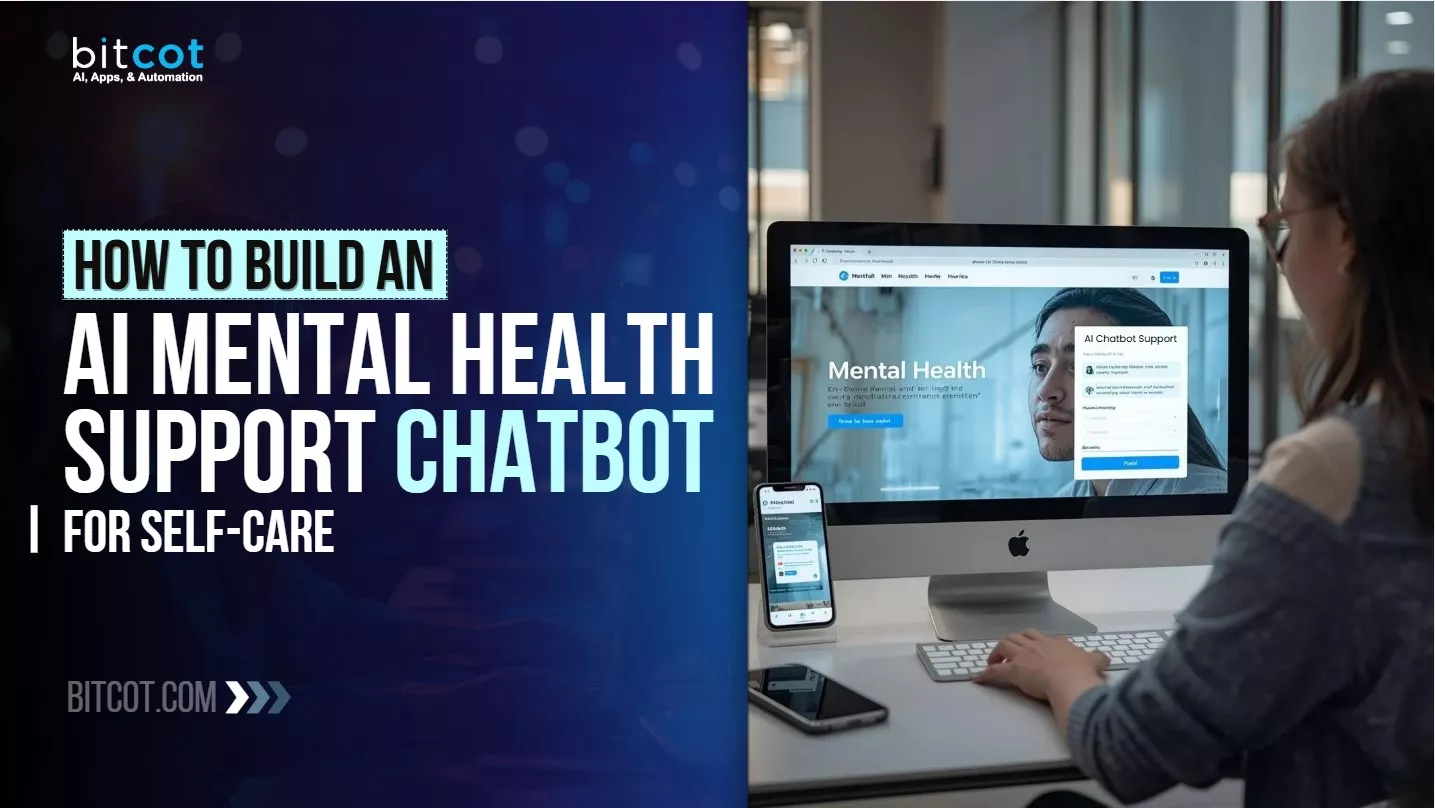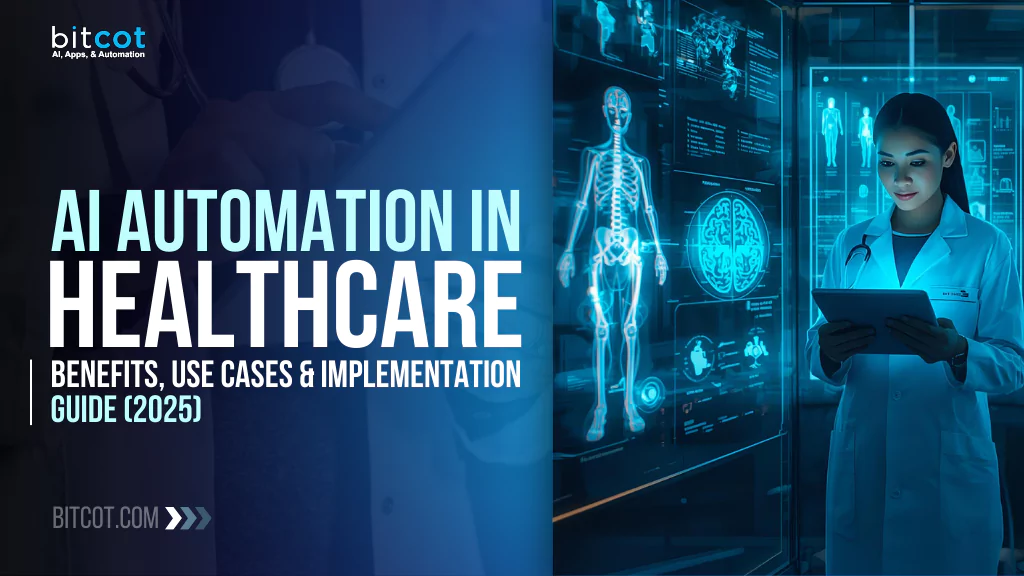
As a healthcare leader, you’re constantly balancing the needs of your patients, your staff, and your organization’s bottom line.
It’s no secret that the industry faces serious challenges, from rising costs and staffing shortages to the pressure of delivering high-quality care.
So, how can you continue to meet these demands while improving efficiency and patient outcomes?
The answer could lie in AI automation.
AI isn’t just a buzzword; it’s a powerful tool that’s already making a significant impact in healthcare. It’s not about replacing your teams but empowering them to do more, with less stress.
Think about automating healthcare tasks with AI like scheduling, billing, and patient data management. That’s time back in the day for your clinicians and support staff to focus on what truly matters: patient care. Plus, AI can help your teams make more informed decisions faster, whether it’s through predictive analytics or advanced diagnostic tools.
In this blog, we’ll take a deep dive into how automation in the healthcare industry is reshaping healthcare organizations, improving operational efficiency, reducing burnout, and enhancing patient outcomes. We’ll explore real-world examples of AI in action and discuss how adopting this technology can help your organization stay ahead of the curve.
What is AI Automation in Healthcare?
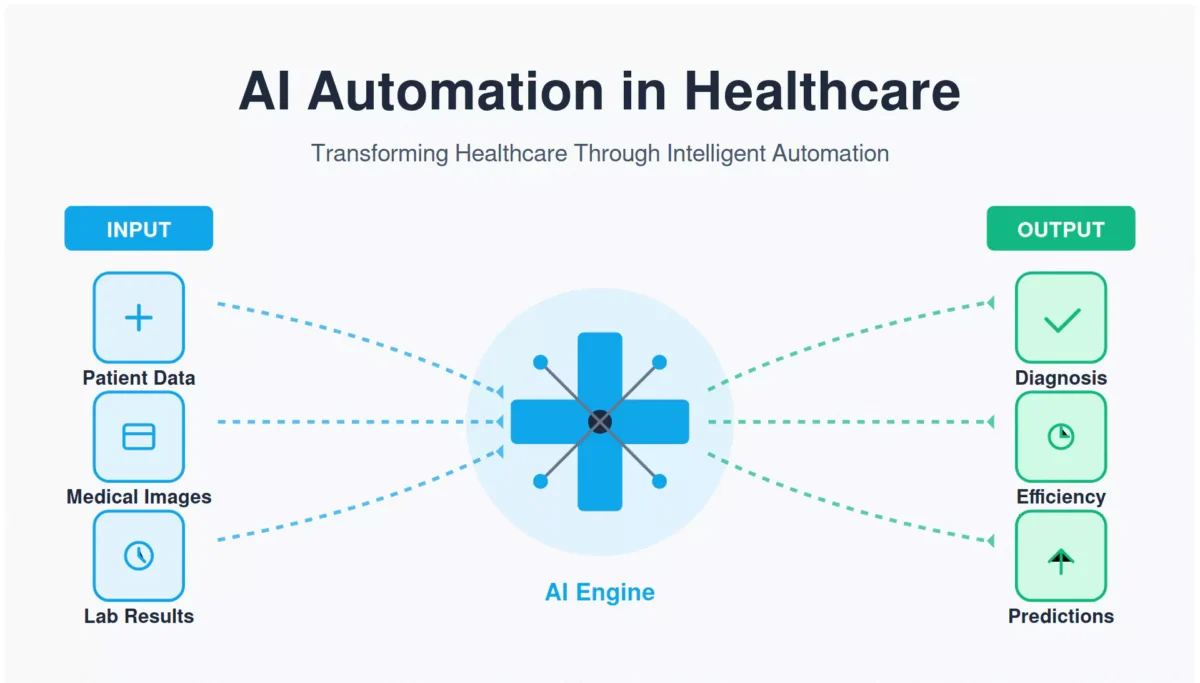
AI automation in healthcare refers to the use of artificial intelligence (AI) technologies to automate healthcare workflow and processes within the healthcare system.
It involves applying AI algorithms, machine learning, and data analytics to perform functions that traditionally required human intervention, thus streamlining operations, reducing workload, and improving the quality of care.
At its core, AI automation encompasses a variety of tools and systems that can carry out tasks automatically or semi-automatically, based on patterns and insights derived from data.
For example, AI can automate administrative processes like scheduling appointments, billing, and managing patient records, which are often time-consuming and repetitive for staff. These automated processes help reduce human error, increase efficiency, and free up time for healthcare professionals to focus on more critical tasks.
In clinical settings, AI automation extends beyond administrative work to support clinical decision-making. AI can analyze vast amounts of patient data, such as medical records, lab results, and medical images, to identify patterns, make predictions, and even suggest treatments or diagnoses.
For example, AI systems can help doctors by flagging unusual readings in patient vitals or suggesting potential diagnoses based on symptoms and historical data.
AI also plays a key role in predictive analytics within healthcare. By examining historical data, AI can predict outcomes, such as which patients are at higher risk of developing certain conditions or which may need to be readmitted to the hospital. These predictions can inform proactive care strategies, improving patient outcomes and reducing hospital readmissions.
Overall, AI automation in healthcare is about using advanced technologies to handle repetitive tasks, assist in decision-making, and analyze large sets of data to improve efficiency and care. It’s a tool that enhances the capabilities of healthcare providers and organizations, ultimately leading to smarter, more efficient, and patient-centered care.
Also Read: Healthcare Automation Solutions for Hospitals and Clinics: A Complete Guide
Benefits of AI Automation in Healthcare
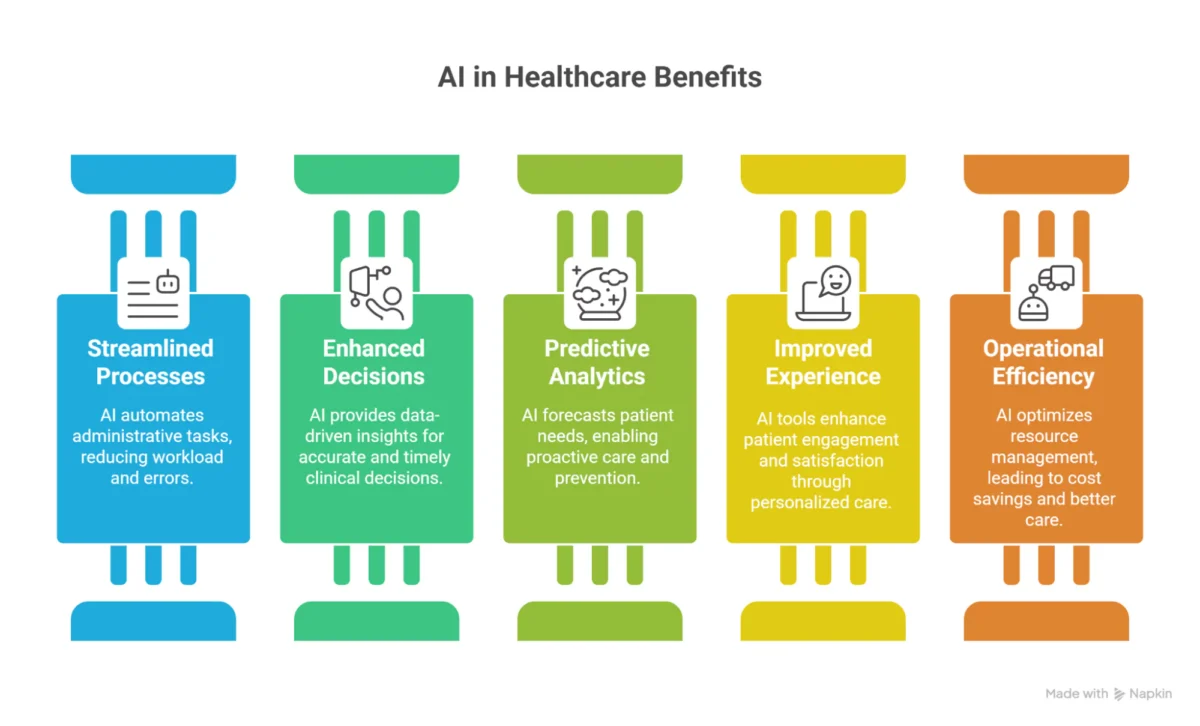
AI automation is revolutionizing healthcare by improving operational efficiency, enhancing patient care, and empowering healthcare professionals with powerful tools to make better decisions.
These benefits are driving healthcare organizations to adopt healthcare automation software across various functions, from administrative work to clinical decision-making.
Let’s explore the key advantages of AI automation in healthcare:
Streamlined Administrative Processes
Healthcare systems are burdened with a significant amount of administrative work that takes up valuable time and resources. Tasks like scheduling appointments, verifying insurance details, processing claims, and managing patient records are often tedious and prone to human error.
Understanding how AI reduces administrative burden in hospitals starts with recognizing where staff spend most of their time—not on patient care, but on paperwork and data entry.
AI automation can help alleviate this burden by handling these tasks with speed and accuracy. AI-driven systems can automate appointment scheduling, match patients with available doctors, and send reminders to reduce no-shows.
Additionally, AI can assist with billing and claims management by automatically verifying patient information, processing claims, and flagging discrepancies. This reduction in administrative workload not only saves time but also reduces human error and administrative overhead, allowing healthcare staff to focus on more critical activities.
Enhanced Clinical Decision-Making
AI is transforming clinical workflows by providing tools that help healthcare professionals make more accurate and timely decisions. By analyzing vast amounts of patient data, from medical histories and diagnostic tests to imaging scans, AI can identify patterns and offer actionable insights.
For example, AI-powered systems can assist with medical imaging, helping radiologists detect early signs of diseases such as cancer, cardiovascular conditions, or neurological disorders. These tools can also offer treatment recommendations based on the latest clinical guidelines and patient history.
By supporting clinicians with data-driven insights, AI improves the accuracy of diagnoses, shortens decision-making time, and ultimately leads to better patient outcomes.
Predictive Analytics for Proactive Care
One of the most powerful applications of AI in healthcare is its ability to predict patient needs and risks before they become critical. Predictive analytics uses historical data and advanced algorithms to identify patterns and forecast potential health issues.
Healthcare leaders want to know whether predictive analytics truly improves patient outcomes. The evidence shows that when hospitals can identify at-risk patients before complications occur, they can intervene earlier and more effectively.
For instance, AI can predict which patients are at a higher risk of readmission, enabling healthcare providers to take preventive measures and manage patient care more effectively. AI can also forecast surges in patient volume, allowing hospitals to optimize staffing levels and allocate resources more efficiently.
This proactive approach helps healthcare leaders address issues before they escalate, improving patient outcomes while reducing hospital congestion and operational strain.
Improved Patient Experience
In an age of increasing patient expectations, healthcare organizations must provide a seamless, personalized, and convenient experience.
AI-driven tools like virtual assistants, chatbots, and automated patient portals enhance the patient experience by providing timely information, answering questions, and guiding patients through their care journey. Virtual assistants can help with symptom checking, while AI chatbots can assist with appointment scheduling, registration, and follow-up care.
This not only saves time for patients but also reduces wait times and helps patients feel more engaged in their care. By automating routine tasks and making healthcare more accessible, AI leads to improved patient satisfaction, retention, and overall experience.
Operational Efficiency and Cost Savings
A common concern among healthcare executives is whether AI automation can reduce costs without compromising quality. The answer lies in understanding where inefficiencies exist—from overstaffing during slow periods to waste in supply chain management.
AI automation plays a critical role in optimizing healthcare operations, from managing inventory to improving workforce scheduling. By analyzing data, AI can forecast demand for services, identify bottlenecks in patient flow, and optimize the supply chain.
For example, AI can predict when certain medical supplies will run low or forecast when a specific department will experience peak demand, allowing for better resource planning.
Additionally, AI can optimize staff schedules based on patient needs and expected workload, reducing downtime and ensuring that healthcare professionals are always available when needed. These efficiencies lead to significant cost savings, as healthcare organizations can reduce waste, avoid overstaffing, and deliver more efficient care without compromising on quality.
Real-World Impact of AI Automation in Healthcare
Modern healthcare systems are under considerable strain to ensure excellent care while also dealing with constraints related to budget cuts, rising costs, staffing shortages, and inefficient processes.
In the quest to achieve this, healthcare organizations are increasingly turning to new-age solutions to overcome complex challenges.
For example, one of our healthcare clients was grappling with an overwhelming challenge: managing the real-time evaluation of donor livers during organ procurement. The surgical teams faced immense pressure, needing to quickly assess liver quality to make life-saving decisions.
Manual processes for image uploads and data entry were not only time-consuming but also left room for critical errors, jeopardizing the transplant process. Amid this complexity, the solution arrived in the form of AI-powered automation.
We built the client a groundbreaking platform that streamlined the entire workflow. With the implementation of real-time liver image uploads and automatic mapping of those images to corresponding liver IDs, the transplant teams experienced a transformation.
Now, with the tap of a button, liver images were instantly uploaded, analyzed by AI, and matched to the correct organ in a matter of seconds. This efficient system allowed the doctors to focus on what really mattered: evaluating the donor liver quality and making informed decisions about organ suitability with far greater speed and accuracy.
Our client quickly realized that the automation powered by AI wasn’t just about improving operational efficiency. It was about creating a seamless, data-driven environment that helped them save lives by optimizing critical moments in organ transplants.
They witnessed firsthand how this innovation not only reduced administrative burdens but also gave them the tools to improve patient outcomes significantly.
The introduction of AI in liver transplants, combined with real-time insights, marked the dawn of a new era in healthcare, one where precision, speed, and innovation worked together to offer a better future for patients in need of transplants.
The seamless transformation our client experienced through AI automation in liver transplants is just one example of how AI automation is revolutionizing the healthcare industry.
From reducing administrative burdens to delivering faster, more accurate diagnoses, AI-driven solutions are reshaping how healthcare professionals work, allowing them to focus on what truly matters: patient care.
Practical Applications of AI Automation in Healthcare
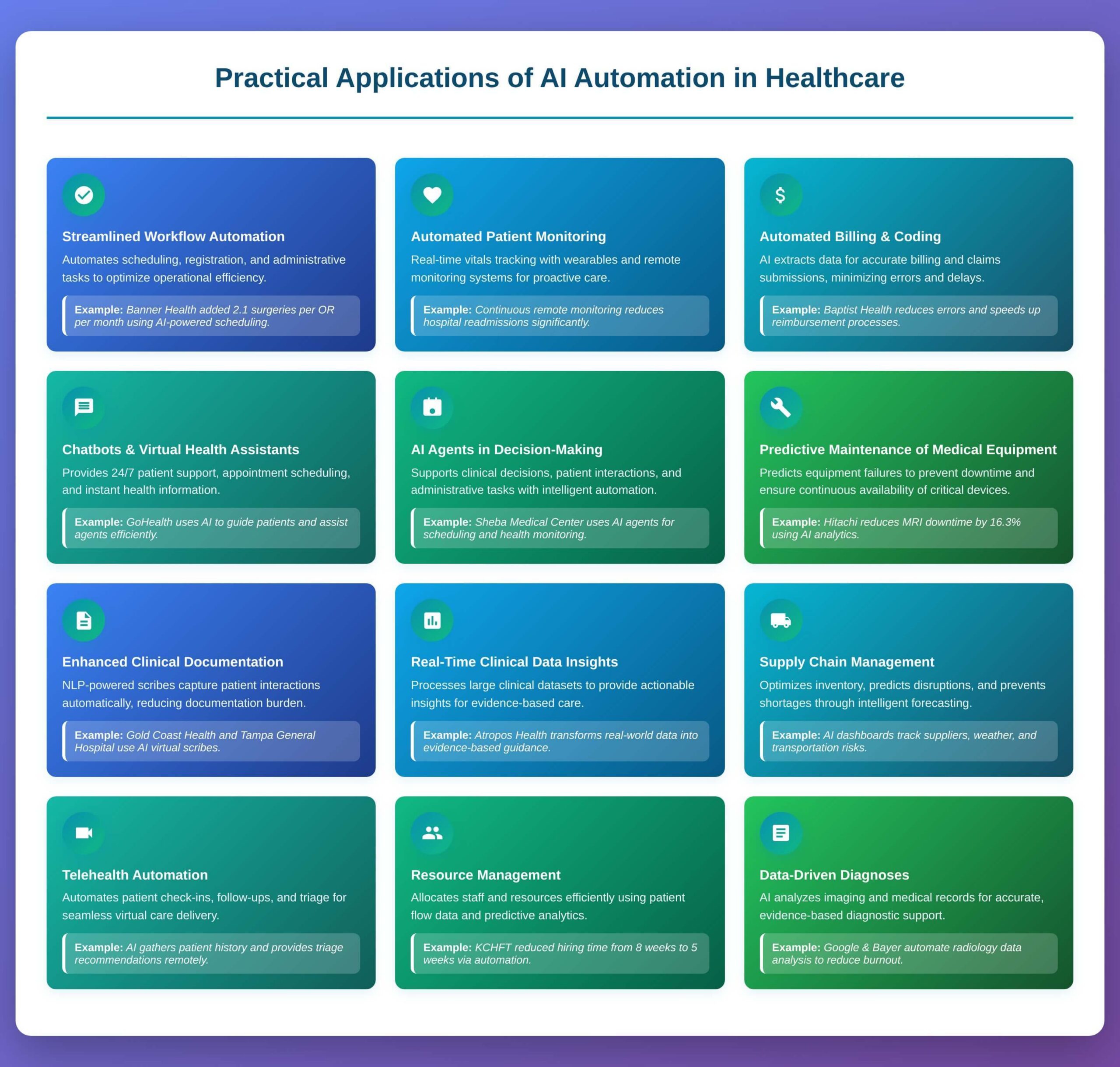
The era when automation was simply about transferring data from one point to another is behind us.
Today, we have AI algorithms that can work alongside robotic process automation to revolutionize surgical procedures by providing real-time data analysis and insights during operations, guiding surgeons with precision and even predicting potential complications.
This goes beyond traditional automation; it represents a new wave of intelligent process automation in healthcare.
By implementing intelligent automation (IA), healthcare organizations can gain the capacity to manage a greater volume of patient care, streamline operations, and enhance overall service delivery without compromising the quality of care.
Streamlined Workflow Automation
One of the primary benefits of AI automation in healthcare is the ability to streamline workflows. With workflow automation involving repetitive tasks such as data entry, appointment scheduling, and patient registration, healthcare organizations can automate healthcare provider workflows and reduce the administrative burden on staff.
For instance, increasing surgical services revenue is a top priority for many health systems, but reliance on manual operating room scheduling and operational inefficiencies can impede these efforts.
Banner Health, one of the largest nonprofit healthcare systems, faced the challenge of optimizing its operating rooms (ORs) to meet growing surgical demand with fewer schedulers. To address this, they partnered with an AI-powered operations software provider to automate OR scheduling and operations.
The technology utilized predictive analytics and real-time data to streamline scheduling, significantly improving efficiency. Within six months, Banner Health reported that it added 2.1 additional surgical cases per OR per month and achieved a 97% year-over-year improvement in case minutes performed within released block time—a clear example of automation in hospitals delivering measurable results.
Automated Patient Monitoring
AI automation is revolutionizing patient monitoring through wearable devices and remote patient monitoring tools. These technologies continuously track patient vitals, such as heart rate and blood pressure, and alert healthcare providers to any abnormalities in real-time.
This capability enables quicker interventions, enhancing patient safety and reducing hospital readmissions.
For instance, Banner Health has implemented remote patient monitoring solutions that allow healthcare providers to track patients’ vital signs from home. By enabling continuous, real-time tracking of vital signs and health data, these systems facilitate early detection of potential health issues, allowing for timely interventions.
This approach not only improves patient outcomes but also optimizes healthcare resources, enabling staff to focus more on direct patient care while effectively managing chronic conditions.
Automated Billing and Coding
Automating financial transactions, such as invoicing patients or insurance companies for medical services, is often complicated. There are many steps involved, including coding treatments and procedures, managing insurance claims, and ensuring correct payment. Due to this, mistakes such as incorrect charges or claims denials are common.
AI automation simplifies this process by extracting relevant information from patient records and generating accurate billing codes.
For example, Baptist Health in Florida has implemented AI in its revenue cycle management. By automating prior authorizations and claims submissions, AI reduces the risk of errors in billing processes, leading to faster reimbursement and improved cash flow.
The health system also employs AI to reduce patient no-shows and optimize scheduling, which supports the revenue cycle by maximizing appointment utilization. Additionally, AI contributes to clinical documentation improvements, ensuring that all services rendered are accurately captured for billing purposes.
Chatbots and Virtual Health Assistants
AI-enabled chatbots and virtual health assistants are reshaping how patients interact with healthcare systems. These AI workflow assistant healthcare solutions handle routine inquiries, provide information on services, and assist patients with appointment scheduling.
Patients today expect immediate responses to their healthcare questions. AI chatbots provide 24/7 support, helping with everything from appointment scheduling to symptom assessment, without requiring staff to be available around the clock.
For instance, GoHealth utilizes AI-powered tools like PlanGPT to support licensed insurance agents in guiding consumers through their Medicare Advantage options. This system helps agents quickly retrieve essential information from lengthy plan documents, enabling them to offer personalized recommendations more efficiently.
Additionally, GoHealth’s AI-powered sales coach prepares agents for real-life scenarios, enhancing their ability to provide compassionate service during crucial decision-making moments for consumers.
By leveraging these technologies, GoHealth not only streamlines agent workflows but also ensures that consumers receive timely and accurate guidance, ultimately improving the overall experience in navigating health coverage options.
AI Agents Powering Healthcare Decision-Making
AI agents are at the forefront of revolutionizing healthcare by acting as virtual assistants, automating complex decision-making, and providing real-time support.
These intelligent agents can streamline numerous processes such as clinical decision support, patient interaction, and administrative tasks, driving greater efficiency and accuracy across the board.
For example, Sheba Medical Center in Israel has integrated AI agents into its system to assist patients with scheduling, providing pre-appointment instructions, and even monitoring health data remotely. This helps ensure patients stay informed, while healthcare professionals have more time to focus on critical care decisions.
In the long run, the adoption of AI agents in healthcare will continue to enhance patient care, optimize operations, and reduce costs, making healthcare systems smarter, more efficient, and more accessible to all.
Predictive Maintenance of Medical Equipment
Preventive maintenance of medical equipment is essential for ensuring uninterrupted patient care. AI automation can predict when medical devices will require maintenance or replacement by analyzing usage patterns and performance metrics.
This proactive approach minimizes downtime and ensures that healthcare facilities have the necessary resources available when needed.
For example, Hitachi’s Sentinel Analytics service employs AI and data analytics to monitor superconducting MRI systems, analyzing sensor data to detect early signs of potential failures.
By identifying issues before they lead to breakdowns, this system allows healthcare providers to schedule maintenance in advance, significantly reducing equipment downtime by 16.3% and enhancing overall patient care.
Enhanced Clinical Documentation
Precise clinical documentation is essential for providing quality patient care. AI automation enhances this process by using natural language processing (NLP) to capture and organize clinical notes efficiently.
For example, an initiative at Gold Coast Health involves an AI-powered virtual scribe, an ambient listening solution that automates note-taking and the production of various clinical documents during patient consultations.
This solution combines voice-to-text technology, enabling clinicians to save time and focus more on patient interactions rather than paperwork. The trial involves over 70 medical specialists and aims to validate the technology for broader use in the future—demonstrating practical automation in healthcare examples.
Another example is Tampa General Hospital (TGH) using an AI-powered tool called DAX Copilot, which captures patient interactions through ambient listening and automatically converts these conversations into clinical summaries.
Real-Time Clinical Data Insights
AI automation is key to processing and analyzing large volumes of clinical data. By identifying trends and patterns, these systems support evidence-based decision-making and help healthcare organizations optimize their care delivery processes.
A prime example of this is Atropos Health, which leverages its GenAI platform to transform real-world clinical data into actionable insights. Through their innovative application, ChatRWD™, Atropos Health dramatically reduces the time needed to produce high-quality, publication-grade evidence from months to mere minutes.
This efficiency enables healthcare providers to quickly access personalized, evidence-based guidance, thereby enhancing their clinical decision-making.
By automating the generation of real-world evidence, Atropos Health not only streamlines workflows but also empowers healthcare professionals to focus more on patient care rather than administrative burdens.
Supply Chain Management
One of the biggest disruptions to healthcare supply chain management happened during Hurricane Maria in 2017. The storm hit Puerto Rico hard, causing a major shutdown of the island’s pharmaceutical and medical device industry.
This left healthcare providers everywhere struggling without essential equipment, medications, and critical devices needed for patient care.
Supply chain risk management has evolved from being a manual and labor-intensive process. AI automation streamlines this process by optimizing inventory management, reducing waste, and preventing overstocking.
Modern AI systems help healthcare organizations maintain visibility into supplier risks and prevent shortages before they impact patient care. By analyzing data from suppliers, transportation networks, weather patterns, and global events, AI can predict disruptions and suggest alternative sourcing strategies—showcasing automation in the medical field at its finest.
Thanks to advanced analytics and AI, healthcare organizations now have ongoing visibility into the risks faced by their suppliers, allowing them to adapt as needed.
Modern supply chain risk management solutions gather data from various sources, such as suppliers, transportation companies, media reports, and weather updates. AI then consolidates this information into a single dashboard, assigning risk scores that align with business objectives and priorities.
Telehealth Automation
The rise of telehealth solutions has made healthcare more accessible, especially during the COVID-19 pandemic. AI automation enhances telehealth by automating processes such as patient check-ins, appointment reminders, and follow-ups.
However, while telemedicine has simplified data collection, the reliance on expensive imaging technologies has increased costs without always improving care quality. A more cost-effective approach is gathering comprehensive patient history, though it is often overlooked due to its time-consuming nature.
AI can address this by automating the process, offering diagnostic clues and follow-up questions based on patient responses, making history-taking faster and more thorough.
In a virtual triage setting, AI tools gather basic information like demographics and symptoms, asking a series of questions that mirror a doctor’s diagnostic approach.
After answering 10 to 20 questions, the system can confidently offer a triage recommendation, guiding patients toward self-care, a healthcare consultation, or urgent care when necessary. These recommendations also suggest the most appropriate consultation method, whether in-person or remote.
Resource Management
AI automation optimizes resource management in healthcare settings. By analyzing patient flow and staffing needs, these systems can help healthcare organizations allocate staff effectively and manage facility resources more efficiently.
For example, Kent Community Health NHS Foundation Trust (KCHFT) has implemented an innovative automation program that has significantly transformed its approach to resource management.
By automating healthcare processes like recruitment and workforce administration, KCHFT has reduced the time to hire staff from over 8 weeks to just under 5 weeks. This streamlined approach allows the organization to respond more effectively to staffing needs, ensuring that adequate personnel are available to meet patient demands.
Additionally, the integration of AI in analyzing operational data enables KCHFT to optimize staff allocation based on real-time patient flow and demand forecasts. By leveraging AI-powered tools, they can anticipate peak periods for patient visits and adjust staffing levels accordingly—creating an automated workflow hospital environment that adapts to changing needs.
Automating Data for Better Diagnoses
AI automation is revolutionizing data analysis in healthcare by processing and interpreting vast amounts of clinical data, including medical imaging, electronic health records, and more, to identify trends, outcomes, and areas for improvement.
By identifying trends and patterns, AI-powered systems enable evidence-based decision-making.
The accuracy of AI in diagnosing diseases has become a critical topic as healthcare organizations evaluate these technologies. Research shows that AI serves as a powerful diagnostic partner, complementing physician expertise rather than replacing it.
In a collaboration, Google and Bayer are addressing the challenges of radiologist burnout with AI-powered tools that automate the analysis of radiological data.
By utilizing Google Cloud’s generative AI technology, Bayer’s platform will streamline workflows by automatically extracting insights from billions of medical images, allowing radiologists to focus on making accurate diagnoses rather than getting bogged down in manual data entry and analysis.
Current Market Trends Driving Healthcare AI Automation
AI’s future in healthcare opens doors to life-changing innovations, discoveries, and a hopeful outlook.
According to Deloitte‘s “Predicting the Future of Healthcare and Life Sciences in 2025” report, advancements in AI and automation in healthcare are set to transform the healthcare landscape by enabling more efficient operations, enhancing patient outcomes, and paving the way for personalized care.
As we move into 2025 and beyond, several trends are set to shape the healthcare landscape, driving the integration of AI technologies to address pressing challenges.
Here are the key market trends expected to dominate the next few years:
AI-Driven Precision Medicine
In 2025-2026, personalized and precision medicine will be accelerated by AI, particularly through advances in genomic data analysis. AI algorithms will become more adept at analyzing complex genetic information, enabling doctors to tailor treatments based on a patient’s unique genetic makeup.
This will lead to more effective and targeted therapies, particularly in oncology, rare diseases, and chronic conditions, improving outcomes while reducing the trial-and-error approach in treatment plans.
AI-Powered Clinical Decision Support Systems (CDSS)
AI-driven Clinical Decision Support Systems (CDSS) will become integral tools in everyday clinical practice. By 2025, AI will not only assist in diagnostics but will also guide healthcare providers in real-time decision-making, offering insights based on the most up-to-date clinical evidence, patient data, and medical history.
These systems will reduce clinical errors and improve decision-making speed, especially in high-pressure environments such as emergency rooms or intensive care units.
Widespread Use of AI Agents in Patient Engagement
By 2025-2026, AI agents (chatbots and virtual assistants) will become essential in managing patient engagement. Organizations will increasingly use AI workflows in healthcare through AI-powered agents to automate patient intake, appointment scheduling, symptom checking, and even provide mental health support.
These AI agents will significantly enhance the patient experience by offering 24/7 availability and personalized interactions, reducing the burden on staff while improving accessibility for patients.
Real-Time Remote Patient Monitoring and Predictive Analytics
The use of remote patient monitoring (RPM) will explode in 2025-2026, with AI at the heart of these innovations. Wearables and IoT devices will continuously collect patient data, and AI will analyze this information in real-time to predict potential health issues.
This trend will be particularly beneficial for chronic disease management, enabling healthcare providers to intervene before conditions worsen. Predictive analytics powered by AI will enable better management of conditions like diabetes, heart disease, and respiratory illnesses, leading to improved long-term health outcomes. Organizations implementing workflow automation for healthcare will see the greatest benefits from these predictive capabilities.
AI-Enhanced Medical Imaging and Diagnostics
In the coming years, AI in medical imaging will see rapid adoption. AI algorithms will not only assist radiologists in detecting conditions like cancer, fractures, and neurological diseases more quickly but will also offer predictive insights, helping clinicians to identify potential risks early.
By 2025-2026, AI will be a core part of the diagnostic process, allowing for faster, more accurate readings and enhancing early detection, which is critical for improving survival rates in conditions like cancer and stroke.
AI-Powered Drug Discovery and Development
AI is set to drastically transform the drug discovery process in 2025-2026. By accelerating the identification of potential drug candidates and predicting their efficacy, AI will reduce the time and costs associated with bringing new drugs to market.
AI algorithms will help researchers analyze vast amounts of data from clinical trials, medical literature, and genomics to identify promising compounds and speed up the process of drug development.
AI in Predictive Healthcare Operations and Workforce Optimization
As hospitals and healthcare providers look to optimize operations, AI will be used to predict and manage staffing needs and resource allocation. By analyzing historical data, patient flow, and other operational metrics, AI will help hospitals predict demand and optimize resource distribution in real-time.
This will help improve the efficiency of healthcare facilities and reduce burnout among healthcare workers. The implementation of automation in hospitals and healthcare systems will become a competitive differentiator for leading organizations.
Regulatory Frameworks and Standardization of AI in Healthcare
As AI becomes more embedded in healthcare, regulatory bodies will finalize frameworks and standards for AI technologies.
In 2025-2026, healthcare organizations will be required to comply with standardized protocols to ensure that AI tools meet safety, reliability, and ethical standards. This will help foster trust in AI solutions and encourage wider adoption across the industry.
Partner with Bitcot to Build Your Custom AI Automation Solution
Healthcare organizations face unique challenges that require specialized AI automation solutions.
Bitcot combines deep healthcare industry expertise with cutting-edge AI to deliver custom automation that improves patient outcomes, reduces costs, and ensures regulatory compliance while seamlessly integrating with your existing healthcare systems.
- Healthcare-Specific AI Automation Expertise: We understand the complexities of healthcare operations, from patient flow management to clinical documentation and regulatory compliance. We know how to navigate HIPAA requirements, interoperability standards, and clinical workflows—delivering healthcare workflow automation that works.
- HIPAA-Compliant Custom Solutions: Every solution we build incorporates privacy and security by design. Our custom automation systems include comprehensive data encryption, access controls, audit trails, and compliance frameworks that meet or exceed HIPAA requirements and healthcare industry standards.
- Clinical Workflow Integration Specialists: We excel at integrating AI automation into existing clinical workflows without disrupting patient care. Our solutions work seamlessly with EHR systems, practice management software, and medical devices to enhance efficiency while maintaining high standards of patient safety.
- Proven Healthcare AI Applications: Our custom solutions span intelligent patient scheduling, automated clinical documentation, medical image analysis, predictive analytics for patient outcomes, and AI-powered diagnostic support systems that improve both efficiency and clinical quality.
- Regulatory Compliance Built-In: We understand FDA guidelines for AI in healthcare, CMS requirements, and state regulations that impact healthcare automation. Our custom solutions are designed to meet current compliance standards and adapt to evolving regulatory requirements.
- Scalable Healthcare Architecture: Every custom healthcare solution we build is designed to scale across departments, facilities, and patient populations while maintaining performance and compliance. Our modular approach allows gradual expansion as your organization grows and evolves.
Partnering with Bitcot means more than just adopting AI; it’s about creating customized, scalable solutions that fit your healthcare organization’s specific needs.
We work with you every step of the way to implement AI tools that improve efficiency, reduce costs, and ultimately enhance the quality of care you provide.
Final Thoughts
As more hospitals and medical institutions are getting big on tech adoption, the benefits of AI automation become clear: efficiency gains, improved patient outcomes, and the ability to process vast amounts of medical information in real-time are just the beginning.
Embracing secure automation and AI in healthcare is not just a trend; it’s a transformative shift that empowers organizations to thrive in an increasingly complex environment.
Bringing automation and AI into every corner of health services can revolutionize the way your organization operates. By leveraging intelligent automation and generative AI, you can make everyday tasks easy for providers, payers, physicians, and patient services.
This not only enhances efficiency and accuracy but also empowers healthcare professionals to focus on delivering exceptional patient care. As automation becomes embedded in routine workflows, it paves the way for a more responsive, effective healthcare system that meets the evolving needs of patients and providers alike.
At Bitcot, we specialize in providing AI automation services that drive operational efficiency, enhance patient care, and improve decision-making in healthcare.
Let’s change the way healthcare works, together. Get in touch with our team to explore how we can help you implement these innovative solutions.





